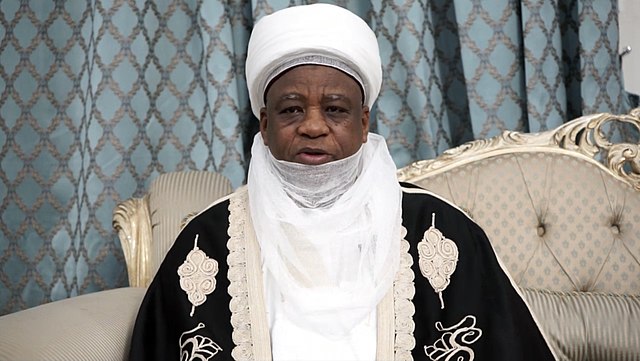Today is Eid ul-Fitr, otherwise called Small Sallah in Nigeria. The Sultan of Sokoto and President-General of the Nigerian Supreme Council of Islamic Affairs (NSCIA), Alhaji Muhammad Sa’ad Abubakar, had on Monday night declared today, Wednesday, April 10, 2024, as the first day of the Islamic lunar month of Shawwal 1445AH and the Eid day to mark the end of the month-long Ramadan fast. In the Islamic lunar calendar, a month is either 29 or 30 days.
In the past 30 days, Muslims have lived a life of self-denial, refraining from negative conduct and other acts that run contrary to the teachings of Islam. Ramadan, as usual, is a period when Muslims seek closer ties with Allah through diverse acts of worship, including almsgiving, recitation of the Qur’an, observance of prayers at night, and seeking forgiveness of their sins. Ramadan has been a full month of spiritual lessons from which we expect Muslims to have resolved to live according to the consecrated tenets of Islam.
The end of Ramadan should not be seen, especially by Muslims, as an end to all the virtues, including charity, good neighbourliness, and tolerance, which in the past four weeks, have characterised their private and public lives. The virtues of kindness, honesty, sacrifice, tolerance and forgiveness should continue to reflect in our daily lives. The broad-mindedness and mutual understanding with which Muslims invited non-Muslims to break the fast with them should, as a way of enhancing national cohesion, go beyond the Ramadan season.
To further religious understanding in a multi-faith Nigerian society, we use the occasion of the 2024 Eid ul-Fitr to call on Muslims to continue to uphold the virtue of peaceful co-existence as exhorted by Prophet Muhammad (pbuh) who, as a practical leading example, lived peacefully with adherents of other religions in Madina. This approach finds expression in the Qur’an 2:256, where Allah revealed to the Prophet that, “Let there be no compulsion in religion: Truth stands out clear from Error.” In light of this verse of the Qur’an, therefore, improper and untoward actions that could result in communal and religious conflicts should be avoided.
The injunction to share even the little that was available to us with others during Ramadan is a call to eschew selfishness, greed and covetousness, all of which have continued to harm in no small measure, the development of the Nigerian society. These evils are consequently manifested in the amoral leadership that has, since Nigeria’s return to democratic rule 25 years ago, bedevilled our nation. It is evident that the only fixation of the leadership is to pillage the nation’s resources to the detriment of the toiling masses. The result, of course, has been abject poverty, an inexcusable unemployment rate, and the almost intractable insecurity of lives and property; a sad and regrettable circumstance indeed!
The same unprincipled leadership is responsible for the current inflation regime and the hardships occasioned by it. Most Nigerians feel that not enough is being done by leaders at all levels to reduce the hardship that was unleashed on them since the removal of subsidy on petroleum products. For instance, the federal government has failed to roll out electric vehicles 10 months after announcing the plan. Interventions by states through widely popularized palliatives have fallen below public expectations. For the kind of equitable society that Nigerians are yearning for to materialise, those entrusted with power are urged to exercise it for the common good of the people they govern.
The salient lesson of empathy taught by Ramadan should equally not be lost on us. The fatigue and the pains of physical deprivation suffered while fasting should guide everyone, especially leaders to care for others who perpetually live under such unfavourable circumstances. Zakat, or poor rate, as part of activities to mark Eid ul-Fitr, is required to be paid by Muslims in the staple food of their respective communities to the poor and the indigent.
This religious duty underscores the need to care for the underprivileged. This being the basic message of Eid ul-Fitr, it behoves leaders to make concrete efforts that seek to increase citizens’ access to the basic necessities of life. That way, the practical benefits of altruistic self-denial carried out during Ramadan would have been achieved.
While we encourage individual Muslims to sustain the discipline imbibed during the just-ended holy month of Ramadan, we similarly advise them against going back to their old habits, including the profligacy of unnecessary exuberance while dining, which undeniably is against prophetic eating traditions. To build a decent Nigerian society lived by upright people, individuals are required to imbibe and exhibit traits of self-discipline.
Sallah is a religious festival that should be marked in the most peaceful manner in order to demonstrate gratitude, not ungratefulness, to Allah. While Daily Trust encourages Muslims to celebrate the Eid ul-Fitr with moderation and restraint as a practical expression of the lessons and message of Ramadan, it calls on Nigerian Muslims to, on the occasion of this Sallah, pray for the country and for the guidance of leaders at all levels; pleading with Allah to grant them the knowledge, wisdom, and willpower to deal with all the challenges confronting Nigeria as a developing nation.
We wish all Nigerians Barka da Sallah.

